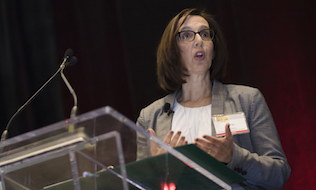
From brain fog to fatigue, cancer patients face a range of challenges when it comes to staying at or going back to work.
And with a significant number of cancer diagnoses happening to people during their prime working years, employers do have a role in supporting employees in dealing with their conditions, a speaker at Benefits Canada‘s Employers Cancer Care Summit said on Tuesday.
Read: Getting cancer drugs to patients a significant challenge
“Having a supportive employer is a very strong motivator to get better and return to work,” Ilene Shiller, a money matters case manager at Wellspring, told attendees at the event at One King West hotel in Toronto.
As Shiller noted, cancer patients deal with a range of issues that affect their health and ability to work. They include the impact on their range of motion as a result of surgery, body changes, emotional difficulties and cognitive impairment. “It’s a very real fear,” she said of patients’ apprehension about cancer returning after treatment.
And in many cases, she added, the effects may not be apparent to others. “I think an iceberg provides a perfect analogy,” she said, citing issues, such as depression, that someone who otherwise looks healthy may be experiencing.
“But under the surface, there may be a number of issues that aren’t apparent to others,” said Shiller, whose organization provides a range of support services to cancer patients.
Read: The case for medium-term disability management
When it comes to cognitive impairment, a big issue is so-called brain fog, according to Shiller. As a result, patients may experience difficulties with concentration, memory and overall executive function. Even tasks such as figuring out how much to tip at a restaurant can be a challenge, said Shiller, who noted research that has shown the brains of people with cancer can go into overdrive at the beginning of trying to do a task.
So what can employers do when a worker is returning to work after cancer treatment? First, they can support them through the process of returning to work, said Shiller, who noted the role of vocational rehabilitation services in helping employees coming back. Allowing people to gradually return to work is also helpful, she added, as are customized cancer support programs. They include exercise programs targeted at cancer patients, rather than working with a personal trainer or joining a gym, she noted.
And among the best practices are compassion and understanding of what the person is going through, she added. “They’re not returning from vacation; they’re returning from a life-changing experience,” said Shiller, citing the fears of failure many cancer patients experience when going back to work. “This just adds to all of the anxiety.”
Read more coverage from the 2018 Employers Cancer Care Summit here
